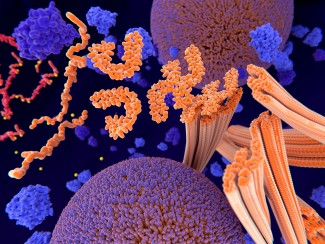Multidisciplinary care
Treatments for PSP
The center of reference for rare or early-onset dementia at Pitié-Salpêtrière Hospital (headed by Prof. Bruno Dubois) www.cref-demrares.fr devotes part of its work to progressive supranuclear palsy. Dr Isabelle Le Ber, neurologist and researcher at Paris Brain Institute, coordinates the national network of expert centers (centers of reference and competence) on PSP. These networks make it possible to bring together a large number of PSP cases, providing more data to advance research into this disease, harmonizing diagnostic practices, and allocating more resources to improve care at national level. The expertise developed within the centers of reference and competence can thus benefit as many patients as possible.
The treatments currently available for progressive supranuclear palsy are symptomatic, as they reduce or eliminate the clinical signs but do not halt the progression of the disease.
The average survival rate for patients is currently six to eight years. Death occurs either through aspiration due to progressive difficulty in swallowing or trauma resulting from a fall. Factors associated with poor prognosis include the patient’s age, frequent falls at the onset of the disease, and swallowing problems.
Nevertheless, multidisciplinary care can improve certain symptoms and provide assistance with daily living. This care is tailored to the clinical presentation and situation of each patient. Physical therapy and speech therapy are important for treating motor and speech problems, cognitive functions, and, if necessary, swallowing issues. Psychological support is available to assist patients and their families. Social support is also important for provision of human or financial assistance when necessary. Patients and their families are also supported by patient associations (http://www.pspfrance.org).
At Paris Brain Institute
A study of transcranial stimulation targeting certain neuronal networks affected by PSP has shown significant effects on cognitive abilities, particularly language, which is severely impaired in some patients. This double-blind placebo-controlled study, conducted by the FrontLAB team at Paris Brain Institute, the Memory Institute, and the National Reference Center (Department of Neurology, Pitié-Salpêtrière Hospital), has demonstrated a significant improvement in the language abilities of treated patients. They find words and their meanings more easily, which suggests that this therapy is beneficial for patients. Trials using iterative stimulation sessions on a large group of patients to validate the therapeutic efficacy of this approach in PSP are currently under way.
In late 2019, the ANSM (the French agency for the safety of medicines and health products) authorized the launch of a Phase 2a clinical trial with the drug candidate AZP2006 for the treatment of progressive supranuclear palsy (PSP).
This treatment is based on a small molecule developed by ALZPROTECT that reduces the phosphorylation of the tau protein – the mechanism responsible for the pathological form of the protein. This therapeutic trial is currently under way at Pitié-Salpêtrière Hospital in Paris (AP-HP), under the direction of Prof. Jean-Christophe Corvol, and at Lille Teaching Hospital (CHU) in Professor Defebvre’s department. The objectives of this clinical trial are to verify the tolerability of the product in patients, to reinforce the pharmacokinetic data for the product after three months of treatment, and to evaluate the impact of the treatment on disease markers (more than 20 markers). Phase 2a is expected to be completed in 2021, with initial results published in late 2021 or early 2022.
The start of this Phase 2a study is an opportunity for patients with PSP, a rare disease for which there is currently no treatment capable of slowing its progression

